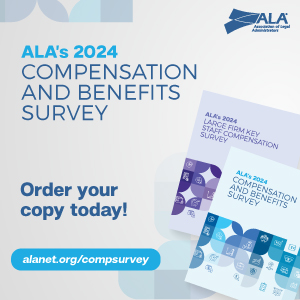AI Isn’t Making “Dumb” Lawyers — It’s Creating Opportunities for Efficiency
As artificial intelligence (AI) reshapes the legal landscape, a growing question lingers: Are we creating “dumb” lawyers by over-relying on technology? With younger generations using AI-powered tools from college to law school to the workplace, some worry that foundational skills — like in-depth research, careful drafting and deep analysis — might get lost in translation. However, while AI revolutionizes legal practice, it doesn’t make professionals “dumber” — it makes them more efficient and faster, opening doors to tackle more challenging problems with fresh perspectives.
For legal administrators, this AI transition represents both a challenge and an opportunity. How can they ensure AI serves as a stepping-stone to enhanced skill and growth rather than a crutch? Here’s a look at why it’s critical for administrators to address these concerns and what they can do to foster a well-rounded, AI-savvy workforce.
Consider AI as an intern: smart, eager to please and excited to help out. Like any intern though, it's there to assist, not to take over. You'd never send an intern's work directly to a client without vetting it, and AI is no different — and like an intern, AI provides extra effort the team can use.
THE PROBLEM: IS AI UNDERMINING FOUNDATIONAL SKILLS?
There’s no doubt AI can significantly lighten the workload. Tedious tasks like combing through case law, extracting key precedents and drafting initial documents can be done in minutes. This efficiency is helping legal professionals maximize productivity: According to the 2024 Legal Trends Report by Clio, AI adoption in the legal industry surged from 19% in 2023 to 79% this year, demonstrating a clear shift toward AI-driven work. But this convenience raises a key question: What happens to new legal professionals who skip learning these skills the hard way?
While AI boosts productivity and responsiveness, studies suggest that young professionals may still need structured opportunities to build essential competencies, ensuring they can validate and enhance AI results rather than just rely on them. In a profession where depth of understanding and nuance can make or break a case, junior professionals need a firm grasp of fundamental skills. It’s not enough to know how to use AI tools; lawyers must also know why certain results matter and be able to cross-check AI-driven insights with their own critical thinking.
THIS IS WHERE LEGAL ADMINISTRATORS COME IN
Legal administrators hold a unique position. They oversee workflows, tool implementation and team development, shaping how AI is used and ensuring junior staff members aren’t bypassing essential learning steps.
Consider AI as an intern: smart, eager to please and excited to help out. Like any intern though, it’s there to assist, not to take over. You’d never send an intern's work directly to a client without vetting it, and AI is no different — and like an intern, AI provides extra effort the team can use.
Consider this: Recent research from Wolters Kluwer found that 73% of organizations said investing in the latest legal technology has attracted new talent. AI isn’t just a tool for the present — it’s a competitive advantage in hiring and retaining the next generation of top talent. Legal administrators can help steer this evolution, ensuring their teams aren’t just tech-savvy but also strategically and analytically strong.
WHAT LEGAL ADMINISTRATORS CAN DO
Legal administrators can implement several strategies to ensure that AI fosters growth rather than limits it. Here’s how they can help young professionals gain essential experience while benefiting from AI’s speed and convenience:
- Set Structured Learning: Legal administrators should ensure continuous access to training and workshops, not only on AI tools but also on fundamental legal practices. This ongoing education reinforces that while AI accelerates certain tasks, the core knowledge behind those tasks remains vital.
- Encourage Mentorship and Peer Reviews: A formal mentorship program allows seasoned lawyers to review and provide feedback on junior lawyers’ AI-assisted projects. By analyzing AI-generated reports alongside a mentor, young attorneys can gain deeper insights into writing, interpretation and client communication. This review process can bridge the gap between AI convenience and the analytical rigor that law demands.
- Build Clear AI Use Protocols: Create in-house guidelines emphasizing that AI is a support tool, not a decision-maker. Protocols that require junior attorneys to validate AI-generated insights ensure they engage with the material, understand its implications and develop critical thinking skills. This will help prevent the “autopilot” approach and foster a mindset of active, informed decision-making.
By championing testing, training and ongoing education, legal administrators drive effective AI adoption and foster creative problem-solving. Continuous improvement turns AI into a dynamic, evolving tool. Firms that harness AI effectively will lead, securing sustainable growth and staying ahead of the competition.

